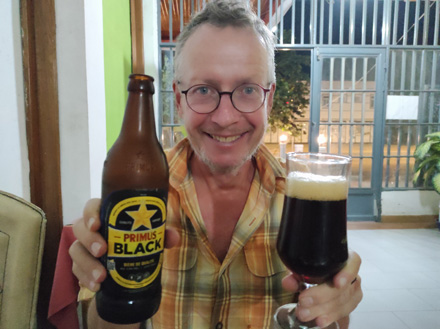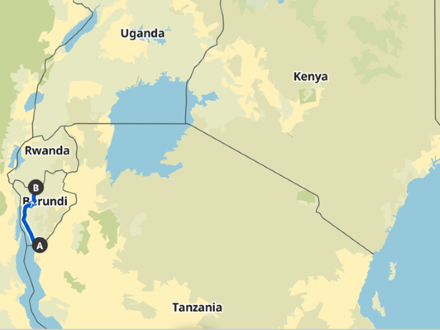
Cycling Burundi from its terraced hills to the shores of Lake Tanganyika, we were entertained by bicycle couriers living on the edge.
Manyovu (Tanzania border) – Nyanza Lac – Rumonge – Bujumbura – Bugarama – Kayanza – Cendajuru (Border with Rwanda)
319 km cycled
April 26 – May 4, 2023
Watch the video!
Visa requirements
We organised our 30-day tourist visa at the Burundian consulate in Kigoma, Tanzania, which cost 90US$ each and took all of 15 minutes processing time! There is a cheaper 3-day transit visa for about 40US$ with extension possibilities in the capital, but small and all as the country is, we didn’t want to be under time pressure. Switzerland is about 1.5 times bigger than Burundi.
At the border, the official had never seen such a visa, and the health officer needed a lot of prompting until she could understand our yellow fever vaccination card! We wondered what qualifications were required to strike a permanent and pensionable job at that border post!

Cycling Burundi!
Don’t be under the illusion that Africa is always hot! A Patagonian style storm complete with a mega downpour and fog was our chilly welcome to Burundi as we climbed up to 1,700masl before rolling down again to Lake Tanganyika. Full use is made of the beautiful terraced hills around here with maize, cassava, beans and bananas reaching to the skies and forming a beautiful backdrop.

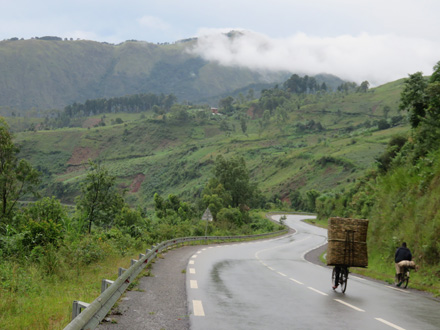
Banking system
In any country, the first stop is generally at the bank to obtain local currency. Our Post Finance Master/VisaPlus debit cards have served us well all around the world, but alas, it was a different story in Burundi. The ATMs wouldn’t accept the cards, so we had to delve into our emergency stash of US$, usually reserved for tourist visas. The entertaining part of it all, was that for the exchange transaction bank officials on numerous occasions either called or escorted us to the black market, which always offered a rate double the official one!!!
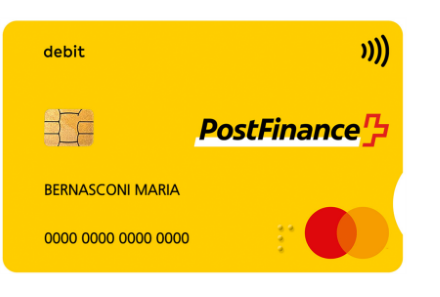
Followers at the drop of a hat!
With a population density of 401/sq km (2.75 times that of Malawi), it never takes long for a crowd to gather in Burundi. By the time Kurt had fixed his puncture one morning, he had no less than 102 onlookers (No exaggeration- Darina counted!). Mzungu attention in such dimensions certainly took a little getting used to.
If we consider the African saying that “a leader without followers is just a crackpot out for a walk”, then the local politicians should have no cause for concern!
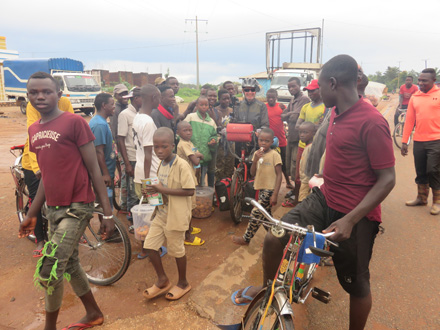

Lake Tanganyika
The RN3 follows the shores of Lake Tanganyika offering some great views of the lake and the forested savanna. This lake, stretching from Zambia through Tanzania and Burundi on the eastern shore, has the Democratic Republic of Congo dominating the west. It is the largest rift lake in Africa, extending 676km north-south and about 50km east-west.

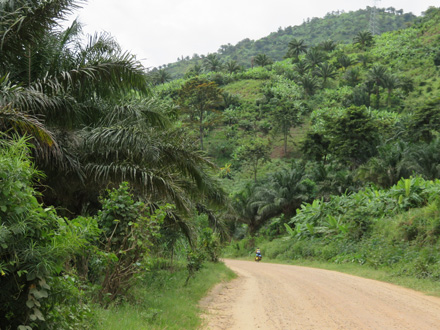

Do we look Chinese?
We often had children tag along for kms on end, this time yelling Chinois/Chinoise! Now, whatever about being called Mzungu (white person), the idea that we could resemble the Chinese tickled our fancy entirely. That was until the Xing Xiang Wa chorus nearly drove us to drink, and tested our nerves entirely. It transpired that the Chinese have been over building roads and the Chinois/Chinoise has become synonymous with foreigner.
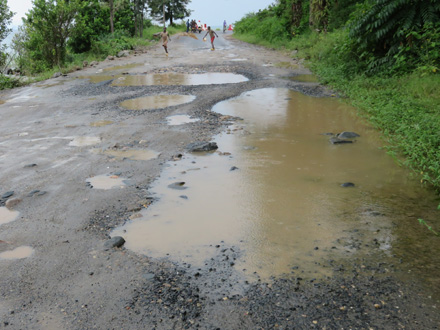
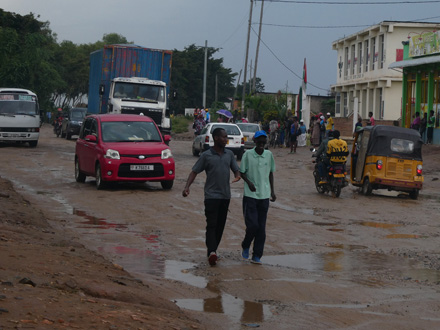
Chimpanzee excursion
We went on a side trip to Bururi Forest Reserve to see chimpanzees in the wild. Having already exchanged most of our US$, we arrived up the mountain with lots of local currency and just 20US$ dollars cash. Unfortunately, the entry fee is 20US$ per person, only payable in US$, unless of course you are a local resident. Darina tried to convince them to mark her down as a local resident, but they weren’t hearing any of it. Our 90-minute taxi ride up the mountain was in vain. Our closest relatives would have to wait until we got back to Europe!

A little history
Burundi was under German rule from 1890 until 1916 at which point the Belgians took over and ruled Burundi and Rwanda indirectly as one country: Rwanda-Urundi. With a divide-and-rule policy, authority was given to the minority Tutsi tribe creating the first division from the majority Hutu tribe.
Racial unrest has continued between the two tribes ever since independence in 1962, culminating in a genocide against the Hutu tribe in 1972 and ethnic violence against the Tutsis in 1993. The omnipresence of police and army fully armed and on the move at all times gave us the sense that all is not well under what seems to be a harmonious surface. French is still one of the two official languages alongside Kirundi.

Drama
The banking drama continued in Bujumbura (the capital), where we thought we would have no problem. Even paying at hotels with visa cards was not an option. Arriving late Saturday afternoon wasn’t great timing either, as we had to knock on the doors of no less than nine hotels before we found a room… and that was one that completely blew our budget. Seemingly, the town fills up with Congolese shoppers at the weekend, the border being only 13 kms away.
Kurt was devastated! Just imagine a Swiss man with no access to his hard-earned cash. Not a pretty sight! He had had it, and was ready to jump on a bus to the Rwandan border. Having exhausted all other possibilities, Darina found a local bank that would accept her Visa credit card. Probably the most expensive withdrawal ever… but it bought us time and allowed us to climb the hill to Rwanda in a more relaxed manner.
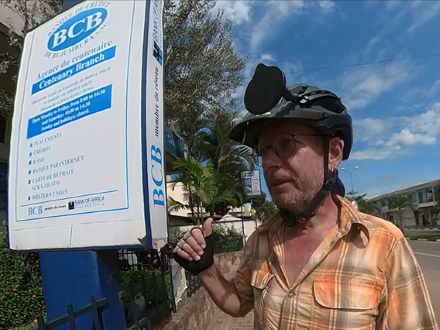
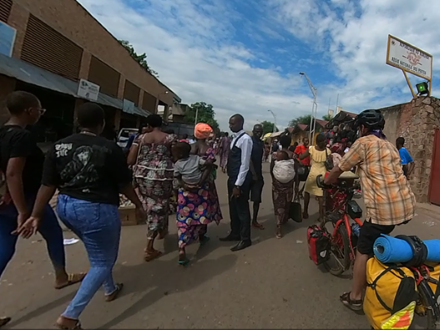
Into the hills
Then it was time to say goodbye to Lake Tanganyika. Cycling Burundi doesn’t come without its physical challenges! The climb from Bujumbura was 1,500m in 30km, the steepest part just as we left town. And for some obscure reason, children appeared in their droves to push Darina up the hill!
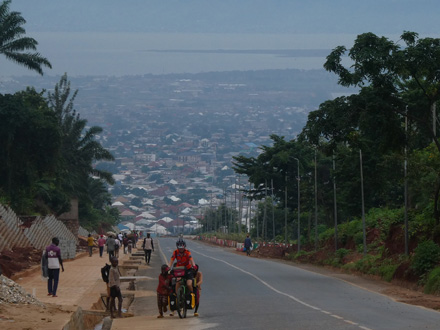


Living on the edge
Burundi’s bicycle couriers take their life in their hands every time they head out to do a day’s work. With loads of up to 250kg, on the many long uphills they hang on precariously to speeding trucks hoping for no abrupt stops, and as they hurtle downhill, they daren’t brake for fear their tyres might burst! Topping speeds of 60kmph, these lads are certainly living on the edge!
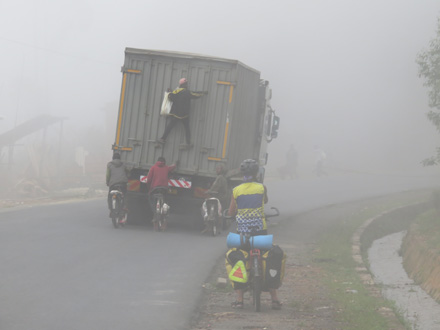
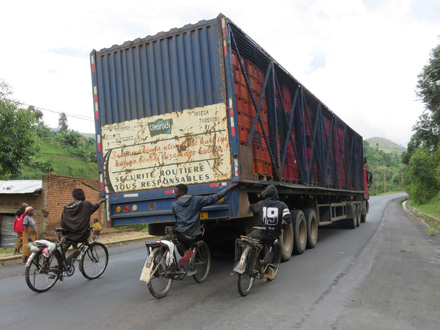

Chimpanzees – Take 2
Close to the highest point, Kibira National Park is also home to chimpanzees. We decided to give it a second go, this time in the company of Ayub and Benjamin from Belgium, who organised the lot and let us tag along. Many thanks for that! There was no US$ requirement in this park which was a great start. First, we hiked through the most beautiful tea plantations, and then a spectacular rain forest with tree ferns and waterfalls all in the search of chimpanzees. But it was not to be. We neither saw nor heard one and concluded that we will have to live without seeing our closest relatives in the wild.

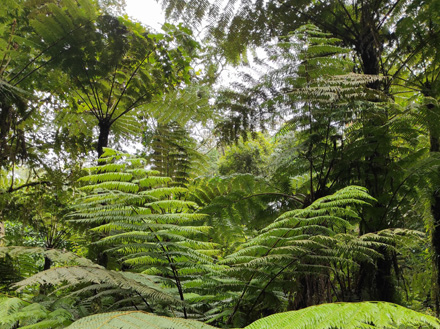
Food
Breakfast was generally beans and chapati or bean and plantain stew with coffee or sweet spiced tea. A breakfast generally set us back 2,000 Burundian Francs (0.66€). In a guesthouse, eggs and toast were a typical start to the day.
Street food was often in the form of goat, beef or liver brochettes (1-2,000 Burundian Francs per piece), served with chips or ugali (maize/cassava porridge).
For dinner, we often had fish or chicken and we even came across a Belgian beef carbonnade stew in one guesthouse. Prices in hotel restaurants varied from 10-20,000 BIF (3-7€) per main course.
Of course, if you were lucky enough to have visited the black market, all of these prices were halved!!!
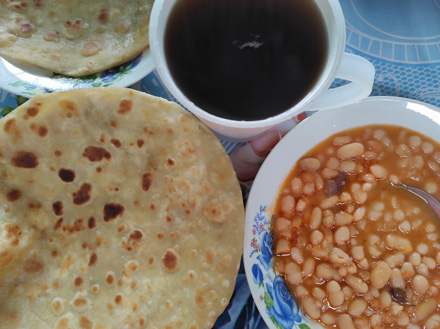
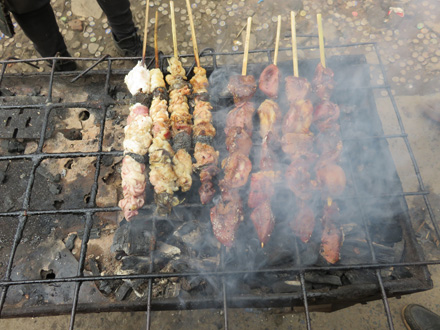

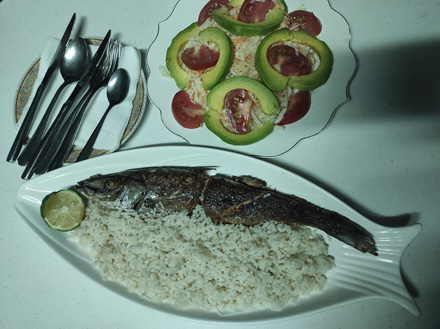
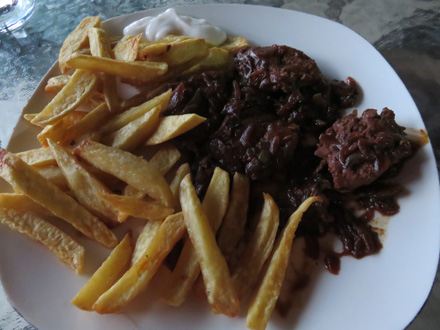

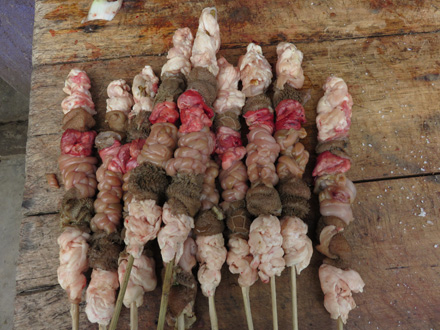
Accommodation
Because of the population density, we stayed in guesthouses right throughout the country. A simple room en suite cost 20,000 Burundian Francs (7€).
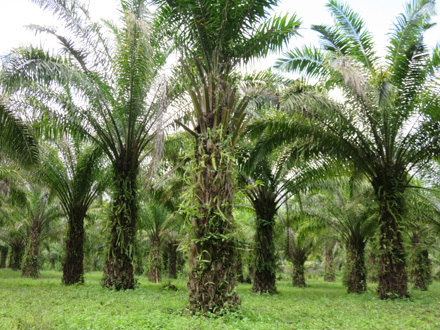
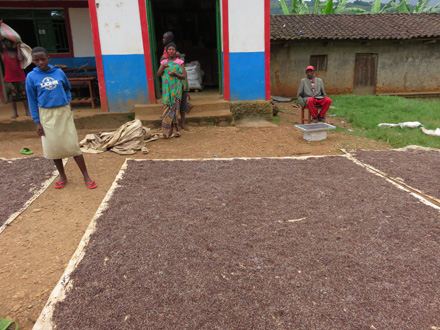
The verdict
We found the Burundians, especially on the stretch after Bujumbura, to be a very cheerful happy-go-lucky bunch. The sheer quantity of people that gathered around us was at times quite daunting, especially as we didn’t have a common language for any kind of quality conversation. French, although a national language is not spoken widely, and English is limited in most cases to greetings and formalities.
The banking system didn’t enhance our stay, and is certainly not the way to attract tourists. If you are planning a visit, line your pockets with US$ and you’ll be fine!
The country is small and five cycling days at a very relaxed pace brought us from border to border. The terraced hills, tea plantations and tropical rainforests coupled with the lake shore make it a very scenic country. But what makes any journey to Burundi special is sharing the road with the intrepid bike couriers offering entertaining and nail-biting scenes as they go about their daily business.

